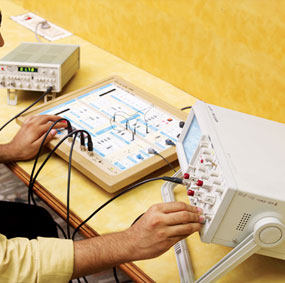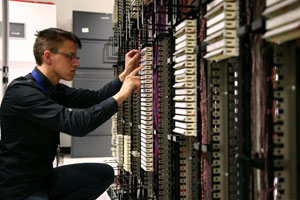Telecommunications Engineer
Tasks & duties

Telecommunications engineers may do some or all of the following:
-
design, provide and keep telecommunications equipment and systems up to date
-
test equipment for faults
-
repair faulty equipment
-
make sure new equipment meets government regulations
-
build and test prototypes of new equipment
-
analyse customer needs
-
help their organisation focus on their product range
-
research information and solve telecommunication-related problems
-
prepare and present reports and proposals on telecommunication-related problems
-
advise on building materials and costs
-
locate and organise telecommunications equipment from overseas to be imported
-
supervise the installation and use of telecommunications equipment
-
provide training for company staff once new equipment has been installed
-
keep up to date with new technology and determine how useful it would be to their organisation
Skills & knowledge

Telecommunications engineers need to have:
-
knowledge of electronics, communication systems and mechanics
-
up-to-date knowledge of engineering methods, technology and industry trends
-
an understanding of telecommunication rules and standards
-
design skills and skill in interpreting drawings and designs
-
computer and maths skills
-
basic knowledge of financial planning and business practices
-
good communication and people skills, including presentation skills
-
research and report writing skills
-
problem-solving and decision-making skills
-
time-management skills
-
cost estimation skills
Entry requirements
To become a telecommunications engineer you need to have a tertiary qualification in telecommunications, electrical and electronics, or computer science.
-
ETITO website – information about apprenticeships and training
Secondary education
A tertiary entrance qualification in English, chemistry, physics, and maths with calculus and statistics is needed to train as a telecommunications engineer.
Tertiary education
A range of study options are available and listed below under Related Courses.
A National Diploma in Engineering (Level 6) is also available.
-
ETITO website – information about the National Diploma in Engineering
Training on the job
The basics of telecommunications engineering are learned through courses, but almost all of the practical applications are learned while working. Telecommunications engineers are required to keep up to date with developments in technology through courses, seminars and workshops for ongoing education and professional development.
Many employers also provide in-house training for their engineers.
Useful experience
Previous work experience in any area of the computing or engineering industry is useful for telecommunications engineers.
Related courses
Communications Equipment Installation and Maintenance
Communications Technologies
Electronic Engineering
For more information, please refer to Career Services.
Document Actions
